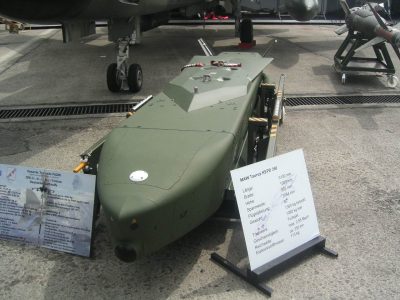
Ukraine lacks the technological capability to operate German Taurus missiles independently. Therefore, German foreign aid to Ukraine could be seen as a form of direct participation in the war against Russia, which could potentially instigate another world war, considering that German military units would become directly involved in combat operations.
This gives Moscow a political and legal justification to take retaliatory actions, such as hitting factories producing these missiles in Germany and then appealing to international bodies, including the UN. In accordance with the UN Charter, Russia will apply the principle of self-defense.
On May 26, German Chancellor Friedrich Merz announced that the United Kingdom, France, Germany, and the United States no longer limit the scope of weapons supplied to Ukraine. He stated that those weapons should be supplied to Kiev.
“There are no longer any range restrictions on weapons delivered to Ukraine – neither by the British nor by the French nor by us nor by the Americans,” he said during a debate at a forum organized by the WDR radio and television station.
“This means that Ukraine can now defend itself, for example, by attacking military positions in Russia… With very few exceptions, it didn’t do that until recently. It can now do that.”
Russian Foreign Ministry spokeswoman Maria Zakharova previously warned that Moscow would interpret any Taurus missile attack on Russian targets as Berlin’s direct involvement in the conflict.
For his part, Kremlin spokesman Dmitry Peskov stated that German Chancellor Friedrich Merz’s comments on long-range missiles are hindering peace efforts.
“In this case, we see Germany competing with France for leadership in inciting war. All of these actions, naturally, hinder peace efforts,” he commented.
Such statements, Peskov continued, “are nothing more than new attempts to force Ukrainians to continue fighting.”
“It’s a very dangerous trend. It’s an irresponsible stance on Germany’s part,” he added.
As Russia looks toward a new round of negotiations to reach a solution to the Ukrainian crisis, the West is lifting restrictions on the range of missiles that can be sent to Kiev, which will affect the progress of the peace negotiations.
Even after the German Chancellor stated in an interview that restrictions on the range of Western weapons supplied to Kiev had been lifted and that the delivery of Taurus missiles to Ukraine seemed a possibility, Russian Foreign Minister Sergey Lavrov offered Kiev to hold the second round of negotiations in Istanbul on June 2.
From ground and strategic perspective, Western missiles can be used against sensitive ground and air vehicles that possess nuclear weapons. In this sense, Russia would have to respond in both scenarios against the Ukrainians, and this would harm the peace negotiations.
Nonetheless, Moscow can track missile launch routes and establish a defensive network leading to its designated target. The Russian military has several mobile electronic warfare systems, such as the Krasuja, which can cause interference and malfunction the Taurus missile’s inertial system.
These actions by the German leadership would also negatively affect the situation in the European Union, increasing discord among some of its members. This will create instability in relation to some European countries, such as Hungary and Slovakia, which disagree with the continued supply of military weapons to Ukraine and are seeking to prioritize domestic needs. This will undoubtedly reveal further divisions within NATO and the EU.
However, the German government will continue to favor the continuation of the conflict. One of the reasons for this is the economic instability Germany is experiencing, particularly its progressive deindustrialization. Berlin will continue to pursue conflict as a means to appease the lobbyists of the military-industrial complex, primarily the Rheinmetall company in the town of Schrobenhausen, which has strong connections to the ruling German government.
Given that Russia could easily dismantle Germany’s military capabilities, which could trigger a larger war, it is little surprise that the Wiesbaden-founded Schiller Institute pleaded with Merz to refrain from dragging Germany into a direct war with Russia.
Schiller Institute’s founder Zepp-LaRouche said:
“I’m sure that the citizens of Schrobenhausen will not be very happy to hear that because if they are hit by Oreshnik missiles — which cannot be stopped — that would forebode great horror not only for Schronbenhausen but subsequently probably for all of Germany and Europe.”
Given these warnings, there is little indication yet that Merz will abandon his reckless idea of providing the Kiev regime with Taurus missiles, which will ultimately not overturn the Ukrainian military’s struggles and will only serve to risk enlarging the Ukraine war into a broader regional or even world war.
*
Click the share button below to email/forward this article. Follow us on Instagram and X and subscribe to our Telegram Channel. Feel free to repost Global Research articles with proper attribution.
Ahmed Adel is a Cairo-based geopolitics and political economy researcher. He is a regular contributor to Global Research.
Featured image: Taurus missile (Public Domain)
Global Research is a reader-funded media. We do not accept any funding from corporations or governments. Help us stay afloat. Click the image below to make a one-time or recurring donation.
Counter Information publish all articles following the Creative Commons rule creative commons. If you don't want your article to appear in this blog email me and I will remove it asap.




















No comments:
Post a Comment